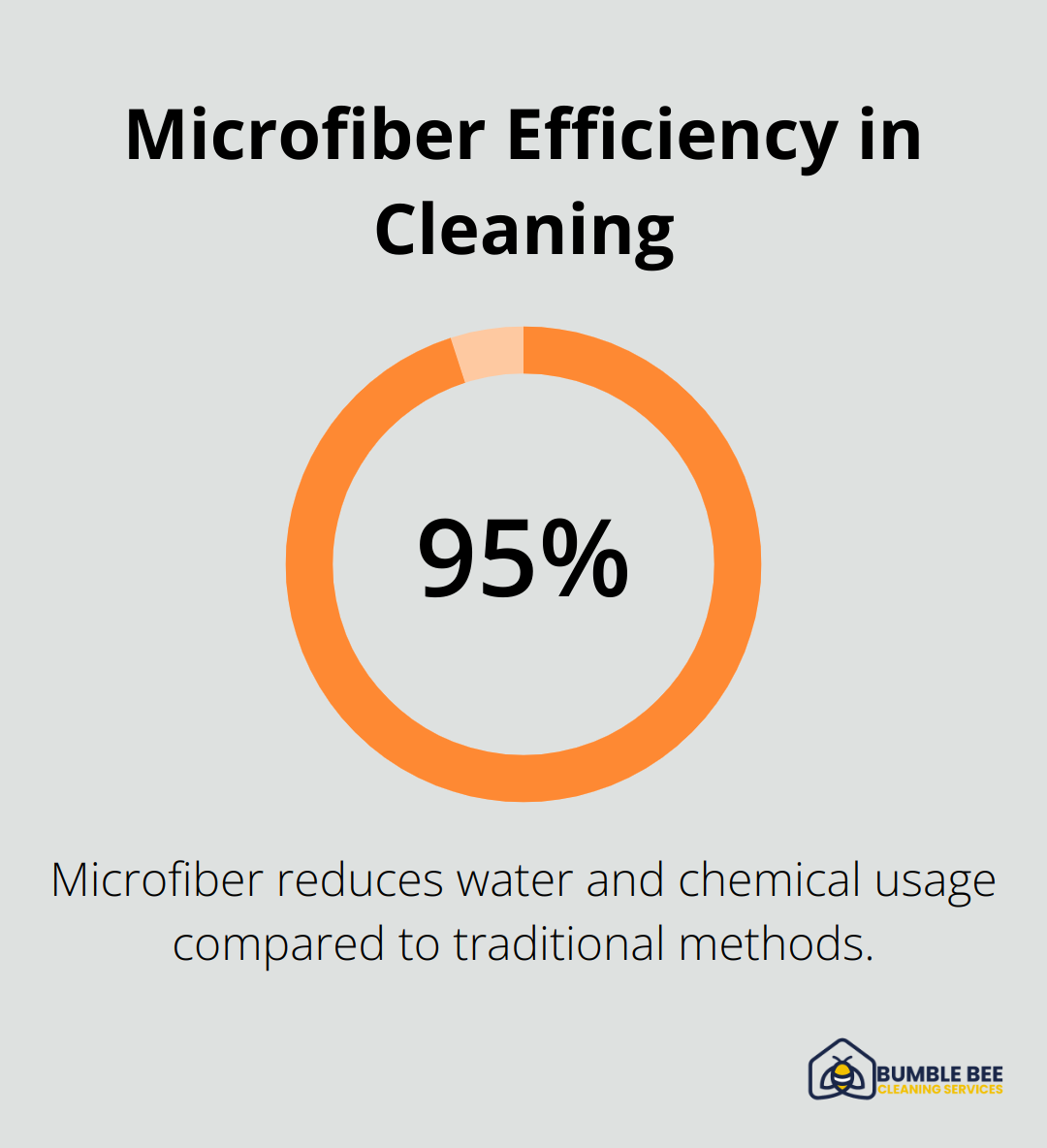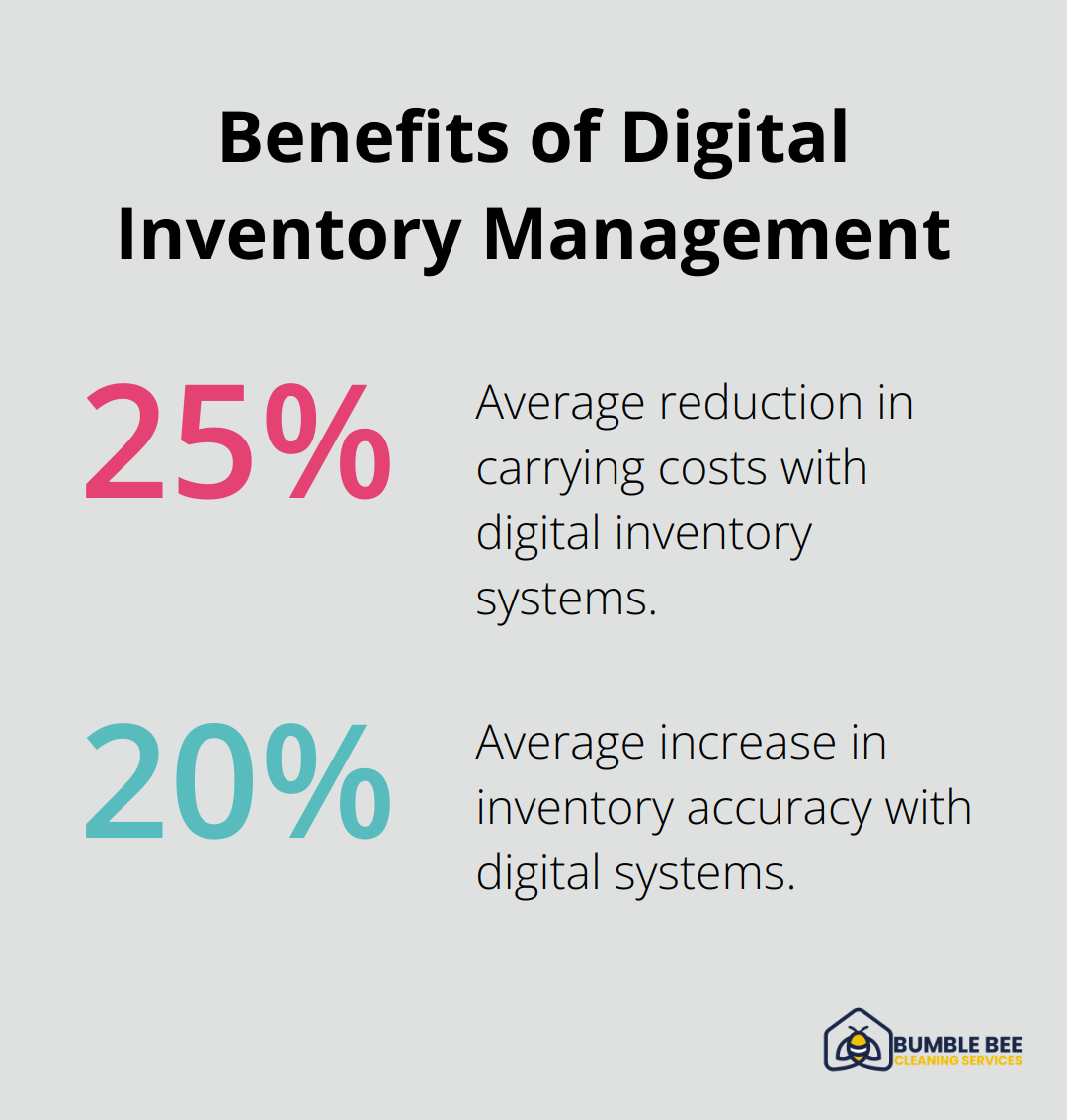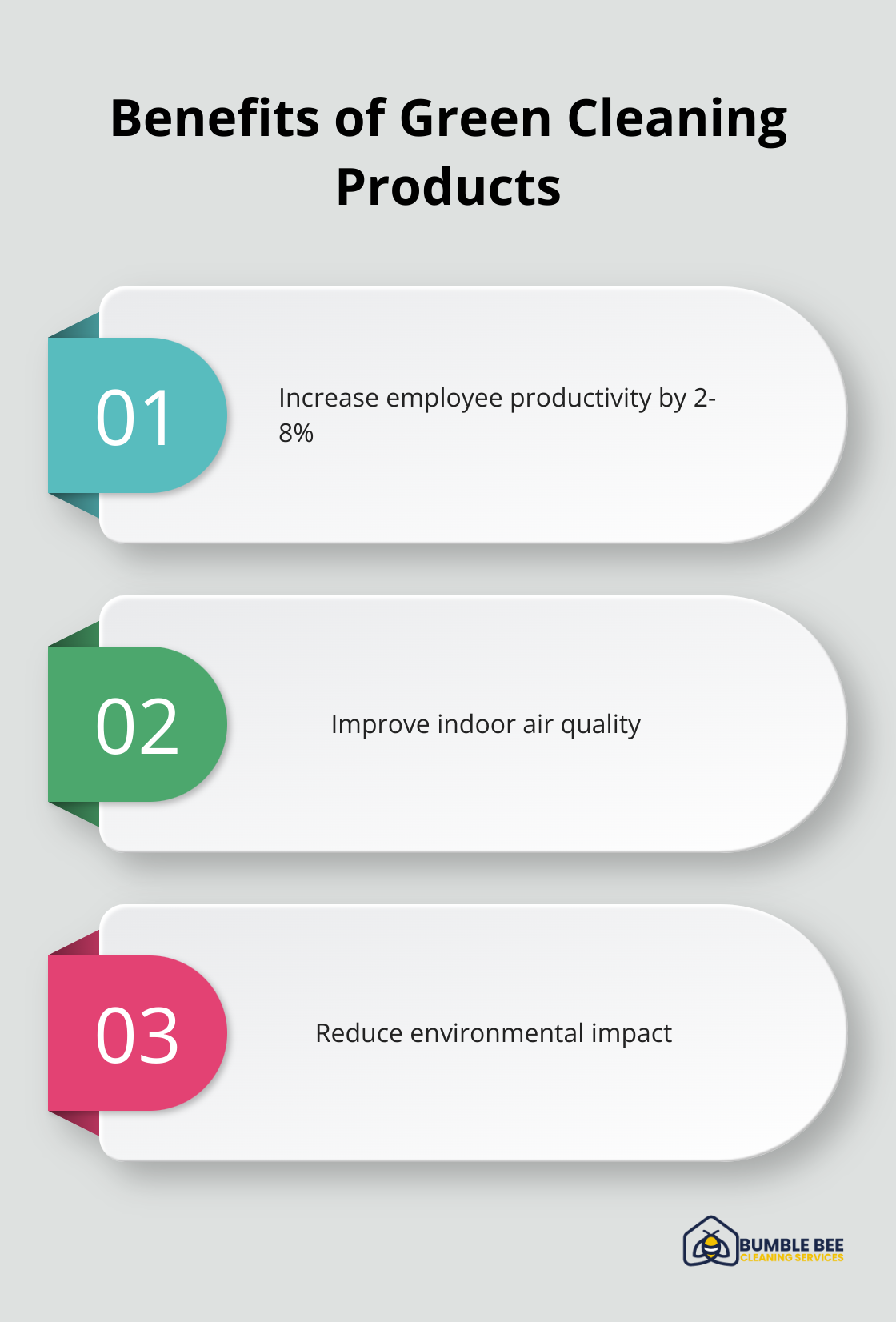Effective janitorial supply management is a cornerstone of maintaining clean and efficient commercial spaces in Seattle. At Bumble Bee Cleaning Services, we understand the challenges businesses face in balancing cost-effectiveness with sustainability.
This blog post will explore essential supplies, inventory strategies, and eco-friendly practices to optimize your janitorial operations. By implementing these tips, you’ll streamline your supply chain and create a healthier environment for employees and customers alike.
Essential Supplies for Seattle Commercial Spaces
Seattle’s commercial spaces require a well-stocked arsenal of janitorial supplies to maintain cleanliness and hygiene. This chapter will explore the most essential items every business should have on hand.
Cleaning Chemicals and Solutions
The foundation of any janitorial supply inventory includes effective cleaning chemicals. All-purpose cleaners, glass cleaners, and disinfectants top the list of necessities. Seattle’s rainy climate demands products that can effectively tackle mud and water stains. pH-neutral cleaners work best for most surfaces, as they prevent damage and extend surface lifespan.
Degreasers play a vital role in commercial kitchens and industrial spaces. The National Restaurant Association recommends sanitizing food preparation surfaces every four hours, highlighting the importance of food-safe sanitizers in these environments.
Tools and Equipment
High-quality mops, brooms, and vacuum cleaners are indispensable for maintaining clean floors. Seattle’s frequent rain necessitates efficient water extraction equipment. Microfiber cloths and mops prove particularly effective, reducing water and chemical usage by up to 95% compared to traditional cleaning methods (as reported by the Environmental Protection Agency).

Larger spaces benefit from ride-on floor scrubbers or burnishers. These machines increase productivity by up to 60% compared to manual methods, according to the International Sanitary Supply Association (ISSA).
Personal Protective Equipment (PPE)
Safety should always take priority. Essential PPE includes gloves, safety goggles, and non-slip shoes. Areas using harsh chemicals may require respirators. The Occupational Safety and Health Administration (OSHA) provides guidelines on required PPE for different cleaning tasks, which businesses must strictly follow.
Green Cleaning Products
Environmentally conscious Seattle has seen a rise in demand for eco-friendly cleaning solutions. Green cleaning products not only reduce environmental impact but also improve indoor air quality. The U.S. Green Building Council reports a 2-8% increase in employee productivity in buildings using green cleaning products, attributed to improved air quality.
When selecting green products, businesses should look for certifications from Green Seal or EcoLogo. These certifications ensure products meet strict environmental standards without compromising cleaning efficacy.
The right combination of these essential supplies enables Seattle businesses to maintain clean, safe, and healthy environments for their employees and customers. Weekly tasks focus on more thorough cleaning to maintain the overall appearance and hygiene of your space, including vacuuming carpets. As we move forward, let’s explore how to effectively manage these supplies through smart inventory strategies.
How to Optimize Janitorial Supply Management
Effective inventory management forms the backbone of maintaining a steady supply of cleaning essentials while minimizing costs and storage space. This chapter explores top strategies to help Seattle businesses streamline their janitorial supply management.
Embrace Digital Inventory Systems
Modern digital inventory systems offer real-time visibility into supply levels, usage patterns, and reorder points. These systems automatically generate purchase orders when supplies run low, which prevents stockouts and reduces the risk of overordering.
A study by the National Association of Wholesaler-Distributors reveals that businesses implementing digital inventory management systems see an average of 25% reduction in carrying costs and a 20% increase in inventory accuracy. This translates to significant savings and improved operational efficiency.

Implement Just-in-Time Ordering
Just-in-Time (JIT) ordering aligns supply deliveries with actual usage, minimizing storage requirements and reducing waste from expired products. This approach benefits businesses with limited storage space, which is often the case in Seattle’s urban commercial areas.
To implement JIT effectively, analyze your usage data to identify patterns and peak periods. Work closely with your suppliers to establish reliable delivery schedules. Many businesses report up to 30% reduction in inventory holding costs after adopting JIT practices.
Strategic Bulk Purchasing
While JIT works well for many items, some supplies offer significant cost savings when purchased in bulk. Identify high-use, non-perishable items suitable for bulk buying. For example, toilet paper, hand soap, and certain cleaning chemicals often come with substantial discounts when ordered in larger quantities.
However, exercise caution to avoid overbuying. The International Facility Management Association warns that excessive bulk purchasing can lead to a 20-30% increase in storage costs and product waste. Balance the potential savings against storage capacity and product shelf life.
Conduct Regular Audits and Stock Checks
Regular inventory audits maintain accurate stock levels and identify inefficiencies in your supply chain. Implement a schedule for physical stock counts (ideally quarterly) to reconcile actual inventory with your records.
During these audits, pay attention to slow-moving items that may tie up capital unnecessarily. The Institute for Supply Management recommends a “First-In, First-Out” (FIFO) approach to prevent product expiration and ensure proper stock rotation.
These strategies can significantly improve janitorial supply management for Seattle businesses, leading to cost savings, reduced waste, and more efficient operations. The next chapter will explore sustainable practices in janitorial supply management, an increasingly important aspect for environmentally conscious businesses in the Seattle area.
How Seattle Businesses Can Embrace Green Janitorial Supplies
Seattle businesses must adopt sustainable janitorial practices to reduce their environmental impact and appeal to eco-conscious consumers. This chapter explores practical ways to implement green cleaning strategies without compromising cleanliness or increasing costs.
Eco-Friendly Cleaning Product Selection
The foundation of sustainable janitorial supply management lies in choosing the right products. Businesses should select cleaners certified by Green Seal, which is a global nonprofit committed to making sustainability everyone’s business. These products often come in concentrated forms, which reduces packaging waste and transportation emissions.
Product lifecycle consideration is essential when selecting eco-friendly options. For example, microfiber mops and cloths outlast traditional alternatives and require less water and chemicals for effective cleaning. Proper use of microfiber significantly improves cleaning efficiency and reduces the spread of pathogens in office environments.
Packaging Waste Reduction
Minimizing packaging waste is a critical aspect of sustainable janitorial practices. Businesses should opt for bulk purchases of frequently used items to reduce individual packaging. Many suppliers now offer refill stations for cleaning solutions, allowing companies to reuse containers and significantly cut down on plastic waste.
Effective Recycling Program Implementation
A comprehensive recycling program is essential for sustainable janitorial operations. Companies should start by conducting a waste audit to identify recyclable materials commonly discarded in their facility. Clearly labeled recycling bins should be placed in strategic locations to encourage participation.
Janitorial staff must receive proper training to sort recyclables and handle them separately from general waste. Partnerships with local recycling facilities ensure proper disposal of specialized items like electronics or hazardous materials. Many Seattle-based recycling companies offer pickup services for businesses, streamlining the process and ensuring compliance with local regulations.
Staff Education on Sustainable Practices
The success of any sustainable janitorial program depends on proper staff training. Companies should develop a comprehensive training program that covers the correct use of eco-friendly products, waste reduction techniques, and the importance of sustainability in cleaning operations.
Regular refresher courses and updates on new sustainable practices keep staff engaged and informed. Staff should be encouraged to suggest improvements to sustainable practices. Front-line workers often have unique insights into potential waste reduction opportunities or more efficient cleaning methods.
Final Thoughts
Efficient janitorial supply management forms the foundation of clean, safe, and sustainable commercial spaces in Seattle. Smart inventory strategies and eco-friendly practices optimize cleaning operations while reducing costs and environmental impact. Digital systems, timely ordering, and strategic purchasing significantly decrease waste and improve efficiency in supply chains.
Seattle’s business landscape demands sustainability as a standard practice. Companies must select eco-friendly products, cut packaging waste, and implement comprehensive recycling programs to achieve greener operations. These efforts enhance indoor air quality and boost employee productivity (by up to 8% according to some studies).

We at Bumble Bee Cleaning Services understand the complexities of maintaining pristine commercial spaces while adhering to sustainable practices. Our team can help you optimize your janitorial supply management to ensure your business stays clean, efficient, and environmentally responsible. Contact us today to learn more about our tailored cleaning solutions.
